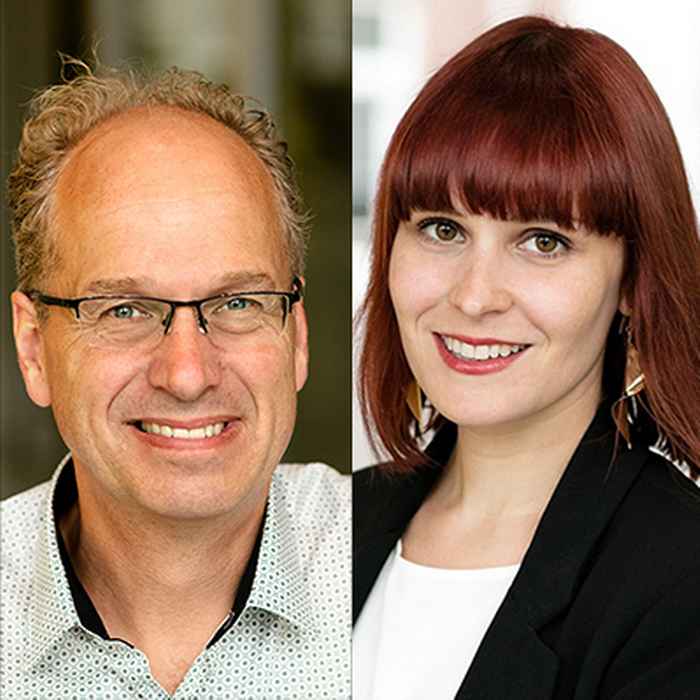What kind of work do the Sales & Recruitment Managers do at UvA EB?
10 March 2021

What exactly is your job role?
Laura: ‘I’m the SRM for 2 executive MBAs: Big Data & Business Analytics and Healthcare Management. I’m responsible for the recruitment process together with an admissions officer and a candidate success coordinator. I work with my colleagues in Marketing to develop and implement the marketing plan and the marketing communication resources. I also compile a competition analysis.
Both of my MBA programmes target professionals with multiple years of work experience. This type of programme is a serious investment (in terms of time and money). That’s why candidates want clarity about how it will benefit them and advance their career. You stay in close contact when you have a promising lead. On average, a candidate takes 4-6 months to decide on whether he or she will enrol in an MBA (some even take 2-3 years). The whole time, you maintain contact with that person.’
Ed: ‘I’m responsible for recruiting ambitious professionals for the Executive Programme in Management Studies (EPMS), sometimes also referred to as Bedrijfskunde in deeltijd. I work closely with an admissions officer, 2 programme managers, a teaching assistant and the programme director. I meet regularly with the other SRMs and EB Marketing & Communication colleagues.’
How many SRMs are there for the Executive Programmes?
Ed: ‘There are 4 SRMs for the EPs’
Laura: ‘And each of them is responsible for 1 or 2 programmes.’
Is there much difference in the work both of you do?
Laura: ‘The duties of the SRMs are quite similar. But the target groups we focus on with our programmes and communication resources are different.’
Ed: ‘The core of our work is recruitment and providing information. EPMS is taught in English and around 20% of the participants are from abroad. The number of international students in the MBAs and the MIF (Executive MSc in International Finance) is much higher.’
Has your work changed a lot over the years?
Laura: ‘On the sales side I’m seeing increased demand for executive programmes and professionals who want to continue their professional development. But at the same time, people are more critical. They ask more questions, take more time to think about enrolling, and they want to know about our USPs and how the programme will benefit their career. There’s also much more competition from other schools and programmes.
From a marketing perspective, we have more and better digital tools and strategies. We use these to generate more leads and to more effectively reach our target group. These tools also help us better highlight our USPs.’
Ed: ‘There’s been much more interest in the EPMS over the past few years, but prospects are also more critical. The programme director explains the composition of the programme during information sessions and we have alumni and students tell more about the programme.’
What kind of impact has COVID-19 had on your work?
Laura: ‘When the pandemic started we saw a huge drop in the number of leads. That was to be expected. People weren’t thinking about possible programmes just then. But the number of leads recovered in May and was quickly back to pre-pandemic levels. COVID-19 has also led to an increase in the number of applications for my programmes. People have more flexibility in their work schedule and are using the opportunity for further professional development.’
Ed: ‘Since we started remote working we’ve been organising information sessions through Zoom webinars, prefereably based out of the Hybrid Learning Theatre. Personal meetings are also held online or by telephone. There was massive interest in EPMS last year. In April 2020 we were prepared for a big drop, but we had more than 90 students starting the programme in September and 76 this past February.’
What are you both working on at the moment?
Ed: ‘I’m working on a competition analysis. How are other business schools responding to the COVID-19 crisis? How are they organising and revamping their range of programmes? And I’m also working on recruitment for students starting in September 2021 and February 2022, with more focus on teaching and education on the campus.’
Laura: ‘Right now it’s the peak period for the MBA Big Data & Business Analytics which starts in September. I’m spending a lot of time following up on the leads, managing the applications and conducting admissions interviews. I’m also working with the marketing consultant on the content strategy for the MBA in Healthcare Management in the coming months.’